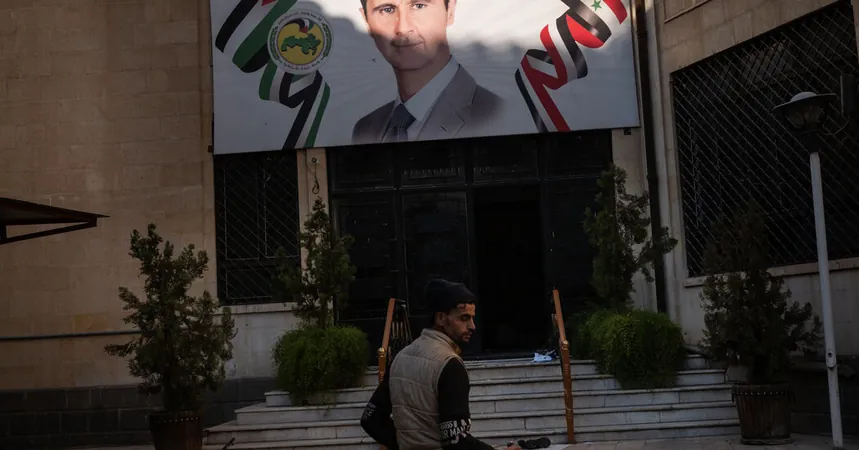
Shocking Claims: Bashar al-Assad's Defiance Amid Rebel Advances
2024-12-16
Author: Ting
In a surprising turn of events, Bashar al-Assad has publicly declared he had no intention of stepping down or fleeing Syria as rebels surged into his key strongholds. In a statement, al-Assad emphasized that he was committed to remaining in Damascus and "carrying out my duties," until early December 8, when he claimed rebels began infiltrating the capital.
Seeking refuge, al-Assad coordinated with his Russian allies to relocate to Latakia, a coastal city, and subsequently arrived at the Hmeimim air base, a critical Russian military hub in Syria. He alleged that the situation escalated to the point where the Russian base itself was targeted by drone strikes, leading Moscow to request an urgent evacuation for him and his entourage.
The Kremlin has echoed al-Assad’s narrative, asserting that he made a "personal decision" to step down. In contrast, al-Assad’s acknowledgement resolves around maintaining his steadfastness, insisting that he would never barter the nation’s future for personal safety.
Under his regime, Syria has witnessed extreme hardships, with the death toll from the civil conflict estimated to exceed 620,000. Human rights advocates argue that al-Assad's relocation to Russia effectively places him beyond the reach of international justice as the country grapples with the aftermath of his family's violent rule for over six decades.
International dynamics have drastically shifted with the collapse of al-Assad’s government. The extremist group, Hayat Tahrir al-Sham—designated a terrorist organization by many nations due to its links to Al-Qaeda—has taken an aggressive stance, filling the power vacuum left behind. Countries that had previously moved towards normalizing relations with Syria are now re-evaluating their approaches in light of the new leadership that they had historically shunned.
European Union foreign policy chief, Kaja Kallas, has urged that humanitarian aid to Syria depends on the new leadership's commitment to protecting minority rights and disavowing extremism. Nations such as Turkey and Qatar, which have had longstanding ties to rebel factions, are now re-engaging diplomatically with the new Syrian government.
Eyewitness reports detailed bombings along the Syrian coast—marking some of the most severe military actions in the area since 2012, with 18 airstrikes targeting military installations. Israel has conducted numerous military actions in response to perceived threats from extremist factions that emerged in the wake of al-Assad's downfall.
As the dust settles, the strength of the newly formed coalition under Hayat Tahrir al-Sham remains questionable. Ahmed al-Shara, a leading figure in the group, has expressed that to solidify their power, they hope to secure economic and political support that would allow many Syrian refugees to return safely.
Moreover, the Kurdish-led forces, previously allied with the United States, find themselves at a crossroads as Turkey seeks to extend its influence under the new regime. The Kurdish fighters fear that their hard-fought gains against ISIS could be jeopardized amidst the newly emerging political landscape.
As international powers, including the U.S., navigate this rapidly evolving situation, the future of Syria remains uncertain. The call for reconstruction and stability is immediate, but whether this vision can be reconciled with the turbulent array of political factions and interests is yet to be seen. Stay tuned for the unfolding saga as Syria grapples with its new reality—a battle for hearts, minds, and territory looms large in a nation still reeling from years of conflict and war.




 Brasil (PT)
Brasil (PT)
 Canada (EN)
Canada (EN)
 Chile (ES)
Chile (ES)
 España (ES)
España (ES)
 France (FR)
France (FR)
 Hong Kong (EN)
Hong Kong (EN)
 Italia (IT)
Italia (IT)
 日本 (JA)
日本 (JA)
 Magyarország (HU)
Magyarország (HU)
 Norge (NO)
Norge (NO)
 Polska (PL)
Polska (PL)
 Schweiz (DE)
Schweiz (DE)
 Singapore (EN)
Singapore (EN)
 Sverige (SV)
Sverige (SV)
 Suomi (FI)
Suomi (FI)
 Türkiye (TR)
Türkiye (TR)